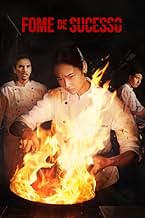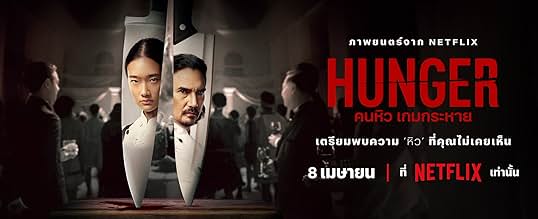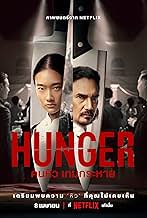Une femme qui gère le restaurant de nouilles de sa famille reçoit une invitation à rejoindre l'industrie de la haute gastronomie sous la tutelle d'un chef tristement célèbre.Une femme qui gère le restaurant de nouilles de sa famille reçoit une invitation à rejoindre l'industrie de la haute gastronomie sous la tutelle d'un chef tristement célèbre.Une femme qui gère le restaurant de nouilles de sa famille reçoit une invitation à rejoindre l'industrie de la haute gastronomie sous la tutelle d'un chef tristement célèbre.
- Director
- Writer
- Stars
- Prix
- 1 victoire au total
Avis en vedette
Hunger is a compelling and thought-provoking film that explores the world of cooking and the class divide that exists in society. The movie follows the story of Auy, a young cook who manages her father's old noodle house. Auy is given the opportunity to work with Chef Paul, the owner of a very popular catering business that caters to the elite.
The film's portrayal of the culinary world is captivating, and the cinematography is excellent. The photography of the cooking process is especially impressive, and it truly brings the audience into the kitchen. The film does an excellent job of showing the stark difference between the food that the poor and the rich eat.
As the story progresses, Auy realizes that she cannot condone Chef Paul's policies and unlawful acts. She decides to quit and forms her own cooking team with the help of an entrepreneur. Her restaurant, Flame, quickly becomes a phenomenon in social media, and she is able to compete with Chef Paul when they are both invited to cook for a socialite personality.
However, the film's ending falls short of expectations. It feels somewhat rushed, and the resolution is not as satisfying as it could have been. The film could have benefited from a different ending that tied up loose ends and provided a more satisfying conclusion.
Overall, Hunger is a movie worth watching for foodies and those interested in exploring social issues through the culinary world. Despite the lackluster ending, the film's excellent cinematography and compelling story make it a must-see.
The film's portrayal of the culinary world is captivating, and the cinematography is excellent. The photography of the cooking process is especially impressive, and it truly brings the audience into the kitchen. The film does an excellent job of showing the stark difference between the food that the poor and the rich eat.
As the story progresses, Auy realizes that she cannot condone Chef Paul's policies and unlawful acts. She decides to quit and forms her own cooking team with the help of an entrepreneur. Her restaurant, Flame, quickly becomes a phenomenon in social media, and she is able to compete with Chef Paul when they are both invited to cook for a socialite personality.
However, the film's ending falls short of expectations. It feels somewhat rushed, and the resolution is not as satisfying as it could have been. The film could have benefited from a different ending that tied up loose ends and provided a more satisfying conclusion.
Overall, Hunger is a movie worth watching for foodies and those interested in exploring social issues through the culinary world. Despite the lackluster ending, the film's excellent cinematography and compelling story make it a must-see.
Very engaging film for any food lover. The main character played by Chutimon Chuengcharoensukying did a terrific job as an actress. You can really feel the emotions during the intense scenes. Sadly she was the only character with any depth. It felt like her world and everyone was just living in it. The supporting roles were kind of interesting but only surface level.
Many of the plot turns were pretty cheesy. The scenes of violence and the reasons behind them were random, weird and had no build up. The head chef was cool, and stoic, which is to be expected from many successful chefs, however, he had outbursts that didn't make that much sense.
There was a few ominous scenes of rich people living out their gluttony with depictions of them eating flesh-like food. It was a clear dynamic between rich people betrayed as greedy while low-status people betrayed as simply, caring, loving, yet frustrated. It was very interesting to see this depiction, especially during the flashback scene of the Head Chef's upbringing. The comment about the caviar had me burst out laughing.
The cinematography was enjoyable and the dishes looked great. Its probably was kept me engaged the most.
Overall, this film was good. I would recommend it for sure. Many aspects were rushed, and had little development, but remained exciting and had scenes that moved me. The ending will leave most with lots of questions and unfulfilled, but you will give reflections.
Many of the plot turns were pretty cheesy. The scenes of violence and the reasons behind them were random, weird and had no build up. The head chef was cool, and stoic, which is to be expected from many successful chefs, however, he had outbursts that didn't make that much sense.
There was a few ominous scenes of rich people living out their gluttony with depictions of them eating flesh-like food. It was a clear dynamic between rich people betrayed as greedy while low-status people betrayed as simply, caring, loving, yet frustrated. It was very interesting to see this depiction, especially during the flashback scene of the Head Chef's upbringing. The comment about the caviar had me burst out laughing.
The cinematography was enjoyable and the dishes looked great. Its probably was kept me engaged the most.
Overall, this film was good. I would recommend it for sure. Many aspects were rushed, and had little development, but remained exciting and had scenes that moved me. The ending will leave most with lots of questions and unfulfilled, but you will give reflections.
What a weird movie, a very confusing movie that tries way too hard to be impressionable.
The main character is extremely one-dimensional. She pretty much has the same exact facial expression for the entire movie. It's the same deadpan stare that many Asian dramas suffer from.
The story's message is quite simple but the execution is like a hot soda can that exploded inside your car, it's all over the place.
The show is evil, demonic at some points. But for what? It's so extra and beyond that it's comical... Except that it's trying to be serious.
So the result is a bunch of drawn out scenes that do not offer any pleasurable closures. The ending scene is bizarre and the twist comes out of left field.
Give it a try if you desperately need something to try but you won't really be missing out on much if you decide to skip it.
The main character is extremely one-dimensional. She pretty much has the same exact facial expression for the entire movie. It's the same deadpan stare that many Asian dramas suffer from.
The story's message is quite simple but the execution is like a hot soda can that exploded inside your car, it's all over the place.
The show is evil, demonic at some points. But for what? It's so extra and beyond that it's comical... Except that it's trying to be serious.
So the result is a bunch of drawn out scenes that do not offer any pleasurable closures. The ending scene is bizarre and the twist comes out of left field.
Give it a try if you desperately need something to try but you won't really be missing out on much if you decide to skip it.
This is a film of two halves - unfortunately, these two halves belong in different movies.
The first half has the tone and feel of scabrous satire, clearly wanting to deliver social commentary. Here we are skirting really, really close to the same territory explored by The Menu. The second half discards this and, instead, mimics the dynamic and arc of Wall Street - only with restauranteurs. Which is a shame: the first half was visually arresting and had the potential to be both provocative and interesting. The second half less so.
This is another one of those movies which cause me to scratch my head: what did this want to be? What does the film maker imagine this film to be about?
If you're interested in writing, film-making or whatnot, there is such a thing as the elevator pitch. You're in a lift with some hotshot producer. You've got until those elevator doors ping to pitch your movie. This film, alas, fails that simple test.
The first half has the tone and feel of scabrous satire, clearly wanting to deliver social commentary. Here we are skirting really, really close to the same territory explored by The Menu. The second half discards this and, instead, mimics the dynamic and arc of Wall Street - only with restauranteurs. Which is a shame: the first half was visually arresting and had the potential to be both provocative and interesting. The second half less so.
This is another one of those movies which cause me to scratch my head: what did this want to be? What does the film maker imagine this film to be about?
If you're interested in writing, film-making or whatnot, there is such a thing as the elevator pitch. You're in a lift with some hotshot producer. You've got until those elevator doors ping to pitch your movie. This film, alas, fails that simple test.
I remember Chutimon Chuengcharoensukying from 2017's Bad Genius and here too, she's phenomenal. While the easy (and obvious) way to look at Hunger is Whiplash meets The Menu, the writing and direction are both pretty solid. They have an interesting tale to tell here; one that doesn't just stick to the hierarchy in a fine-dining restaurant's kitchen. Of course, those bits are as hard-hitting as they come, but the socio-economic layers that the writing offers, sweeten the pot. The protagonist's character arc is clear-cut, and the transitions that she goes through - physically, emotionally, and financially - are always at the film's forefront.
Not only is the film super engaging, it makes you root for the protagonist's eventual realizations. How far are you willing to go to stay relevant and successful in the modern era? And how much success and relevance is too much? Very pertinent questions like these are answered through fiery exchanges between the leads, against the backdrop of deliciously cooked food (and some grotesque consumption). The film also doesn't shy away from doing its bit on "eating the rich" and speaking in detail of their high-profile perversions. From a thematic perspective, Hunger has as much in common with the Malayalam film Ustad Hotel as the films I mentioned above. Nothing comes above family, I guess?
The scene at the hospital between Nopachai Chaiyanam and Chutimon Chuengcharoensukying is spectacular. Not only does it open eyes to the antagonist's understanding of life, but it also throws darts at the protagonist for the choices she's about to make. Same goes for the climactic showdown between the two, but this section treats celebrity connoisseurs as objects of feeding, hence the lessened impact. If Netflix is doing something right, it's in giving Thai cinema the funding it needs to make competent drama-thrillers like this with great production values and cinematography.
Not only is the film super engaging, it makes you root for the protagonist's eventual realizations. How far are you willing to go to stay relevant and successful in the modern era? And how much success and relevance is too much? Very pertinent questions like these are answered through fiery exchanges between the leads, against the backdrop of deliciously cooked food (and some grotesque consumption). The film also doesn't shy away from doing its bit on "eating the rich" and speaking in detail of their high-profile perversions. From a thematic perspective, Hunger has as much in common with the Malayalam film Ustad Hotel as the films I mentioned above. Nothing comes above family, I guess?
The scene at the hospital between Nopachai Chaiyanam and Chutimon Chuengcharoensukying is spectacular. Not only does it open eyes to the antagonist's understanding of life, but it also throws darts at the protagonist for the choices she's about to make. Same goes for the climactic showdown between the two, but this section treats celebrity connoisseurs as objects of feeding, hence the lessened impact. If Netflix is doing something right, it's in giving Thai cinema the funding it needs to make competent drama-thrillers like this with great production values and cinematography.
Le saviez-vous
- AnecdotesThe house in the opening scene is the same as that of the movie Parasite
Meilleurs choix
Connectez-vous pour évaluer et surveiller les recommandations personnalisées
- How long is Hunger?Propulsé par Alexa
Détails
- Durée
- 2h 26m(146 min)
- Couleur
- Mixage
- Rapport de forme
- 2.35 : 1
Contribuer à cette page
Suggérer une modification ou ajouter du contenu manquant




















